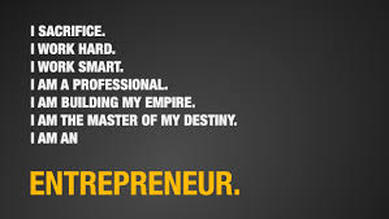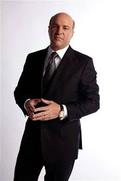
I came across this article at Entrepreneur.com and I thought it was very honest and helpful! After all I run into people all the time that aspire to be their own BOSS. These questiosn really get you to focus on if you have or are willing to develop what it takes. Question #2 in particular I think is the most difficult...I can be VERY disciplined and at times I can be VERY slack!!! LOL. Some may say I work hard and play hard. However, when you are doing what you love, even working hard can be like play. Enjoy the article!
The only difference between people who want to be entrepreneurs and the ones who actually are is the work and the risk of getting started. If you feel like you want to be an entrepreneur but aren’t certain if you’re ready yet, here are five questions to help you determine your capabilities.
1. How comfortable are you with being uncomfortable? Entrepreneurship will mean a lot of uncertainty. If you’re the kind of person who needs a lot of control and a strictly scheduled life, you may not be able to handle the ambiguity that surrounds entrepreneurism. That being said, don’t think just because uncertainty makes you nervous you can’t be an entrepreneur. If you find you have a need for a controlled schedule, that trait could actually work in your favor.
Entrepreneurship requires long hours, hard work and dedication when you start out. Being able to manage your schedule and control your environment could help you with the organization of your business. However, you might want to plan before you leap in. A few great ways to do this are to stockpile savings, already have a business plan you’re prepared to work and seek out a community of support to talk you through the tough times.
Related: Risk is the Admission Fee of Entrepreneurship
2. Are you disciplined? You are totally responsible for yourself. Right now, wherever you’re at, whatever you’re doing -- it’s your choices that got you here. How do those statements feel to you? If you feel yourself bristling and ready to argue, then you might not be in the right mindset for entrepreneurship yet. When you start, you must take full accountability for everything -- there’s no back-up plan on why you got passed over for a promotion or why you didn’t get your report done on time. Clients won’t want excuses and they’ll drop you.
Even when it’s their fault you have to be prepared to deal with the possibility that you’ll have to handle it. You need discipline to survive and stay ahead of your work, ahead of your bills and to grow your business. If you struggle with accountability and discipline, don’t rule out entrepreneurship forever. Take stock of ways your current situation could be improved by better decisions and try holding yourself accountable.
3. How’s your health? Taking care of your body is important for everyone, but can have particularly far-reaching implications for the entrepreneur. There are no sick days in entrepreneurship when you’re getting started. There’s a chance there won’t be for years. That’s going to mean you have to be productive, even when you don’t feel good, or risk missing business opportunities. You have to keep yourself in good health with diet and exercise that keeps your body strong and your mind keen.
Related: When Passion Is a Pitfall and Seeking Bliss Is Bogus
If you aren’t a healthy person, you may want to figure out a plan for improving your lifestyle before you transition into entrepreneurship. Also important, think of how you’ll cover health insurance and medical needs when you start your journey. Get a plan for your health and work it.
4. Do you love what you do and are you good at it? There are going to be long hours in entrepreneurship. If you enjoy what you’re doing and are passionate about your project, that intense amount of work is enjoyable. Don’t fool yourself into thinking money alone will be enough to motivate you.
Make sure you’re passionate about what you’re intending to pursue as an entrepreneur and that you have the skill set to get to work. If you don’t, consider how you can improve your skills before making the leap and how you might get involved in something you’re passionate about doing.
5. Do you play well with others? You might think entrepreneurship is a solo activity, but the truth is that having great relationships is crucial to long-term success. It's not only for the value that comes from referrals and the camaraderie of close relationships, but also for the support you will need. If you’re starting out as an entrepreneur, you’re going to have periods where you need to rely on the strength, wisdom and friendship of others.
Look for opportunities to build your network: mentors, mastermind groups and other programs will help you find the right people. Just be sure that you invest in them, too. Relationships are based on give and take. Build strong relationships and open yourself up to the great support and learning that comes from others.
The only difference between people who want to be entrepreneurs and the ones who actually are is the work and the risk of getting started. If you feel like you want to be an entrepreneur but aren’t certain if you’re ready yet, here are five questions to help you determine your capabilities.
1. How comfortable are you with being uncomfortable? Entrepreneurship will mean a lot of uncertainty. If you’re the kind of person who needs a lot of control and a strictly scheduled life, you may not be able to handle the ambiguity that surrounds entrepreneurism. That being said, don’t think just because uncertainty makes you nervous you can’t be an entrepreneur. If you find you have a need for a controlled schedule, that trait could actually work in your favor.
Entrepreneurship requires long hours, hard work and dedication when you start out. Being able to manage your schedule and control your environment could help you with the organization of your business. However, you might want to plan before you leap in. A few great ways to do this are to stockpile savings, already have a business plan you’re prepared to work and seek out a community of support to talk you through the tough times.
Related: Risk is the Admission Fee of Entrepreneurship
2. Are you disciplined? You are totally responsible for yourself. Right now, wherever you’re at, whatever you’re doing -- it’s your choices that got you here. How do those statements feel to you? If you feel yourself bristling and ready to argue, then you might not be in the right mindset for entrepreneurship yet. When you start, you must take full accountability for everything -- there’s no back-up plan on why you got passed over for a promotion or why you didn’t get your report done on time. Clients won’t want excuses and they’ll drop you.
Even when it’s their fault you have to be prepared to deal with the possibility that you’ll have to handle it. You need discipline to survive and stay ahead of your work, ahead of your bills and to grow your business. If you struggle with accountability and discipline, don’t rule out entrepreneurship forever. Take stock of ways your current situation could be improved by better decisions and try holding yourself accountable.
3. How’s your health? Taking care of your body is important for everyone, but can have particularly far-reaching implications for the entrepreneur. There are no sick days in entrepreneurship when you’re getting started. There’s a chance there won’t be for years. That’s going to mean you have to be productive, even when you don’t feel good, or risk missing business opportunities. You have to keep yourself in good health with diet and exercise that keeps your body strong and your mind keen.
Related: When Passion Is a Pitfall and Seeking Bliss Is Bogus
If you aren’t a healthy person, you may want to figure out a plan for improving your lifestyle before you transition into entrepreneurship. Also important, think of how you’ll cover health insurance and medical needs when you start your journey. Get a plan for your health and work it.
4. Do you love what you do and are you good at it? There are going to be long hours in entrepreneurship. If you enjoy what you’re doing and are passionate about your project, that intense amount of work is enjoyable. Don’t fool yourself into thinking money alone will be enough to motivate you.
Make sure you’re passionate about what you’re intending to pursue as an entrepreneur and that you have the skill set to get to work. If you don’t, consider how you can improve your skills before making the leap and how you might get involved in something you’re passionate about doing.
5. Do you play well with others? You might think entrepreneurship is a solo activity, but the truth is that having great relationships is crucial to long-term success. It's not only for the value that comes from referrals and the camaraderie of close relationships, but also for the support you will need. If you’re starting out as an entrepreneur, you’re going to have periods where you need to rely on the strength, wisdom and friendship of others.
Look for opportunities to build your network: mentors, mastermind groups and other programs will help you find the right people. Just be sure that you invest in them, too. Relationships are based on give and take. Build strong relationships and open yourself up to the great support and learning that comes from others.




 RSS Feed
RSS Feed